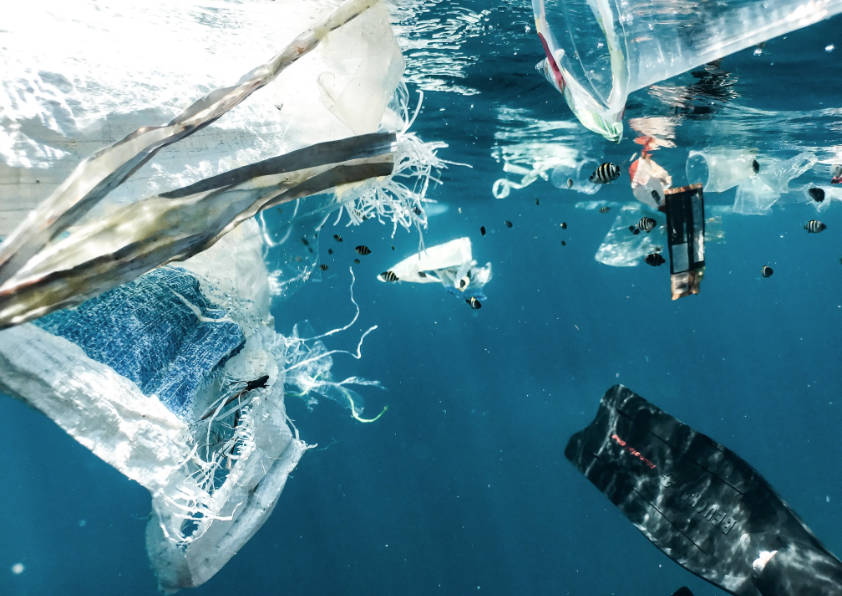As Europe bakes in desert-making heatwaves, and the UK heads for 40ºC summers becoming the norm, we find ourselves at the tipping point of climate change. Actually, we may well be far beyond the tipping point – and just haven’t felt the sensation of freefall yet.
Humankind, or rather, the group with the power to do anything about it, has overshot the 1.5ºC global warming target. And let’s be clear – an average global gain of 1.5ºC is not a good outcome – it’s merely better than 2ºC (the temperature of doom, which will cause huge risks to all forms of life in the long, medium and short-term).
Do you think we’ll look back on this moment in decades to come, and regret every ignored warning? More than likely at this point.
Of course, we can’t talk about climate change without talking about its ugly twin; plastic pollution. Yet, while the two are linked, they are not the same.
Put it this way; if your house was on fire, you’d get out of the burning house – not start tidying it up.
But plastic pollution remains one of the most pressing environmental challenges of our time, climate emergency or not. We’re all aware of the problem, and want to do something about it. Most single-use plastics have been phased out in shops and restaurants. City and county councils have been quite good at initiating recycling schemes – but there’s still so much to do.
Read more: Should recycling be the government’s job?
However – this is all consumer-focused stuff. And it’s not enough to solve the plastic crisis. In fact, it’ll barely make a dent. Why? Because the responsibility for plastic pollution does not lie with consumers. It is squarely on the shoulders of the industries that produce and profit from plastics.
And that includes us.

Corporate responsibility
Globally, just 20 companies are responsible for producing more than half of the world’s plastic waste. These include oil and gas giants, chemical companies, and consumer goods manufacturers. They make plastics from fossil fuels, and design them to be disposable or hard to recycle. The costs of waste management and environmental impact is shifted downwards, to local communities.
Now, you might be wondering why they would make it hard to recycle or reuse their product. Surely that’s not allowed.
But isn’t it obvious? If you can’t use it again or make more out of it, you have to buy new.
Companies at the top of the production chain have the power and resources to change the way plastics are made. But there’s no incentive to do so. As long as they can continue to benefit from the current system of consume, dispose, repeat – there’s no hope for change.
At NPF Packaging, we’ve committed to using recycled material everywhere we possibly can, and adhere to the PPT (Plastic Packaging Tax). We offer guidance on recycling polythene, and promote proper industrial recycling, waste reduction and reuse of plastics.
All of our material is recyclable. The sad truth is, we know that most of it won’t get recycled – because it’s still easier to source new. While the PPT aimed to address this, all it seems to have done is make things more expensive.
Consumer habits are a convenient scapegoat
As a civilisation, we need plastic to continue living this way; with ample food and clothing, proper medical care, and resources on-demand. And while consumers do have a role to play in reducing plastic waste, the problem is not going to be solved by them.
We have to stop blaming the end user for the products we in industry create.
While consumers can choose less polluting products to some degree, we have forced their hand into consuming more and more, cheaper and faster than ever. We can’t pretend that industry would simply change this out of the goodness of its heart; profit comes first.
Yes, individual actions can create ripples of change and will make the microcosm better, at a community level. But the sheer magnitude of the plastic pollution crisis is heavily burdened by the industries that produce and distribute plastic. By shifting this burden solely onto consumers and local recycling initiatives, and by ignoring the systemic problems at the root, industries can conveniently deflect accountability.
So, what’s the answer? It will invariably come from legislation, transparency, and the market.
Governments and industry need to be clear
We all know by now that so-called bioplastics and other plastic packaging alternatives are pretty much scams – textbook greenwashing that does nothing to alleviate the problem, and just helps companies save face. Alternatives are not the answer, because the truth is… there are none.
But we can make steps towards a brighter future.
Firstly, we need to hold industries accountable. If plastic production and consumption figures were public knowledge, with clear links back to who’s responsible, consumers can enact their right to choose better.
Companies in the plastics industry should publish their efforts in R&D, and show that they are looking for a future where ocean plastics are a thing of the past.
Second, governments need to support better recycling and waste management – but also clear end-of-life guidelines for plastics that do not result in more landfilling. The impact of the PPT is still unclear at this point, but even this might have a role to play.
Whatever happens, we’ll keep pushing for more responsible and sustainable plastic use, with everything we do.
Do better with your packaging
Make the shift to recycled polythene. Get a quote online, or call us on 01773 820415.


